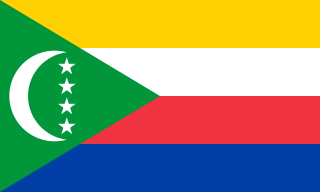 |
|---|
| This article is part of a series on the politics and government of the Comoros |
Twamaya was a political party in the Comoros.
 |
|---|
| This article is part of a series on the politics and government of the Comoros |
Twamaya was a political party in the Comoros.
Based in Anjouan, the party received 0.8% of the vote in the 1992 parliamentary elections. After the results in some constituencies were annulled, the party won a seat in the Assembly of the Union in the subsequent by-elections held in December. [1]

Anjouan is an autonomous high island in the Indian Ocean that forms part of the Union of the Comoros. Its chief town is Mutsamudu and, as of 2006, its population is around 277,500. The total area of the island is 424 square kilometers.

The unicameral Assembly of the Union of the Comoros is the country's legislative body. It was established in 2004, and its predecessor was the Federal Assembly.

The Comoros, officially the Union of the Comoros, is an island country in the Indian Ocean located at the northern end of the Mozambique Channel off the eastern coast of Africa between northeastern Mozambique, the French region of Mayotte, and northwestern Madagascar. The capital and largest city in Comoros is Moroni. The religion of the majority of the population is Sunni Islam.

Elections in the Comoros take place within the framework of a multi-party democracy and a presidential system. The President and the majority of the seats in the Assembly of the Union are directly elected.
The Comorian Union for Progress is a political party in the Comoros.

Parliamentary elections were held in the Comoros on 22 November 1992, with a second round on 29 November 1992. Due to electoral irregularities in the initial elections, there were also by-elections in six of the 42 constituencies on 13 and 20 December.

Early parliamentary elections were held in the Comoros on 12 December 1993, with a second round in all but four seats on 20 December. The elections were held after President Said Mohamed Djohar dissolved the Federal Assembly elected in November 1992.

Parliamentary elections were held in the Comoros on 1 December 1996, with a second round in six seats on 8 December. The result was a victory for the National Rally for Development, which won 36 of the 43 seats, some of them uncontested. In addition to independent candidates, the only other party to run was the National Front for Justice following a boycott by several parties in protest at the lack of an independent electoral commission and revision of the electoral registers. Voter turnout was very low, at around 20%.

The Union for the Development of the Comoros is a political alliance in the Comoros. The party's president is Mohamed Halifa.

The Islands' Fraternity and Unity Party is a political party in the Comoros.

The Movement for Democracy and Progress, also known as the People's Democratic Movement was a political party in the Comoros.

The Democratic Front of the Comoros was a political party in the Comoros.

The National Union for Democracy in the Comoros was a political party in the Comoros.

The Union of Democrats for Development was a political party in the Comoros led by Ibrahim Halidi. Based on Anjouan, it was supportive of the government of President Said Mohamed Djohar.

Maecha Bora was a political party in the Comoros.

Realising Freedom's Capability, also known as Uwezo (Leadership), was a political party in the Comoros.

The Comorian Popular Front was a political party in the Comoros.

The Rally for Change and Democracy was a political party in the Comoros led by Said Hassane Said Hachim.

Dialogue Proposition Action (DPA-Mwangaza) was a political party in the Comoros led by Mohamed Saïd Abdallah Mchangama.

The Party for National Salvation was an Islamic political party in the Comoros.

The Movement for Renewal and Democratic Action was a political party in the Comoros.

Nguzo was a political party in the Comoros.
| This Comoros-related article is a stub. You can help Wikipedia by expanding it. |